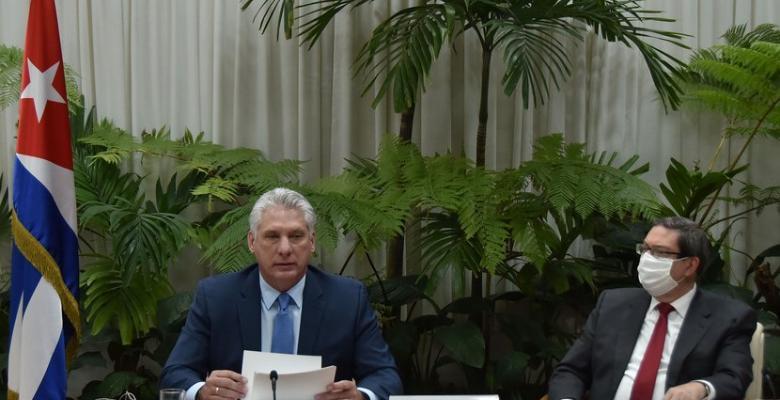Globalization of Solidarity is Paramount
especiales

“If we had globalized solidarity as the market did, the story would have been quite different.” The aforementioned statement was part of president Miguel Díaz-Canel Bermúdez’s speech on Monday morning during NAM Virtual Summit, whose goal was to unite common efforts and will to fight Covid-19. While listening to his words, I definitely recalled Fidel (Castro), our Fidel, the historical leader of the Cuban Revolution.
Fidel was the first who saw it and warned — with his vision of future and profound speech — about the significance of globalization and the imperative need to transcend economical, commercial and communicational fields; being human beings the cornerstone of everything — ideological differences aside, religions, and borders of every kind — the global interconnection would focus its efforts on the common good of people, especially those most in need.
Time has proven that Fidel's warnings are more important than ever before, and in the face of the millions of inhabitants of this great house we call planet Earth, man himself has been able to destroy even the most unimaginable things, prioritizing private interests or people who are only interested in their own well-being, making money at the expense of the suffering of others.
Covid-19 has led us to balance the image conveyed by our societies. It also has shed light on the fact that the most powerful nations and large economies are not really well prepared to face such extreme situation in which, regretfully, hundreds of thousands people have died and millions have been infected in just four months.
Heads of states have concealed situations that jeopardize the health of their people, their continent, the world itself, in order to avoid falling into another economic crisis by ignoring that most of people will be deprived of enjoying such flourishing economy. We have seen them blatantly lie. Some have stood idly and measures have been taken too late and then, they start their political game out of this situation — used as their main weapon, as the meaning of their existence. Summing up, they cannot see over the next hill.
We have witnessed how people’s health, wisdom, and self-esteem have been played. Some powerful nations have played with their most sacred feelings and desires, without caring about the impact of the disease caused by SARS-Cov-2, which affects the whole planet. Of course, after this havoc ends, several studies and researches will be made and we will finally get to know how much this disease hit the poor ones, the despised people, Afro-descendants, Latinos, and emigrants, essentially those who live in marginal areas.
That is why this Virtual Summit held on Monday was so important as it felt real, natural, transparent, aimed at strengthening ties between the governments and peoples of the world, beyond individual interests just to see, in the short term, how each of them plays a role in finding a solution to this situation that has caused too much suffering.
The representatives of member states of NAM and international organizations attending the Summit — via Internet —addressed the current situation and converged in the need to defend multilateralism, work together, and think about a common good in order to go beyond economies that will basically recover afterwards since the lives of people — gone or threatened — are the most important thing as there is no way to get them back. And so was championed by Ethiopia and Namibia, two nations that have endured tough times to become independent countries, part of a continent that is starting now to suffering the pandemic, whose effects may be really terrible if authorities do not take action soon.
Leaders insisted on the ceasefire in conflict-affected areas worldwide, on the eradication of every sort of violence, on the strict adherence to the international right and the UN Charter, on caring about people and saving ourselves as a way to comply with the Sustainable Development Objectives, on the need to eradicate other pandemics such as terrorism and fake news, which divide people and nations, allowing the emergence of a different model based on equity and social justice since human beings need to embrace what unites us, not what divides us.
In this context, unilateral measures, despicable blockades, resources plundering, threats, extortions, or cutting funds to international agencies like WHO and others were rejected as they coordinate immediate and effective responses in the management of resources to that end.
A world challenge needs a strong global response, it was highlighted. That is why the role of Cuba — and its health personnel — were both praised. Likewise, it was condemned the media attacks against those who bring light and life amid darkness, risking their own, with no profits other than the smile of the people they save.
“Let’s boost cooperation, global solidarity, and the effort will be decisive. Let’s do it by defending the right to health, peace, development, and Life!” our president Diaz-Canel said. And this message sums it all up. And it paves the way for a future, once this nightmare is over, to see beyond the horizon when global solidarity prevails once and for all. Let’s be clever. Fidel already warned us all; the human species is in jeopardy.
Translated by Sergio A. Paneque Díaz / CubaSí Translation Staff













Add new comment